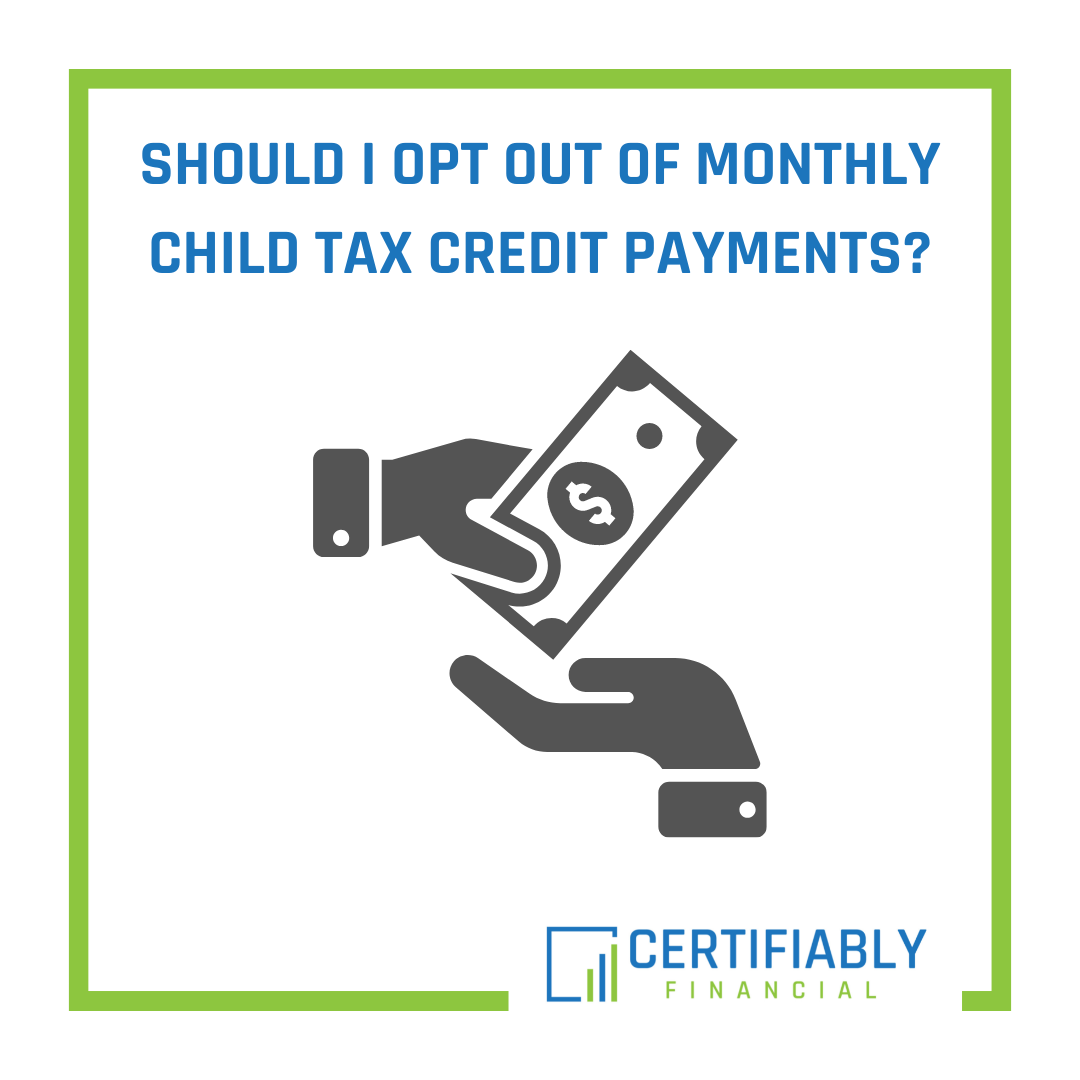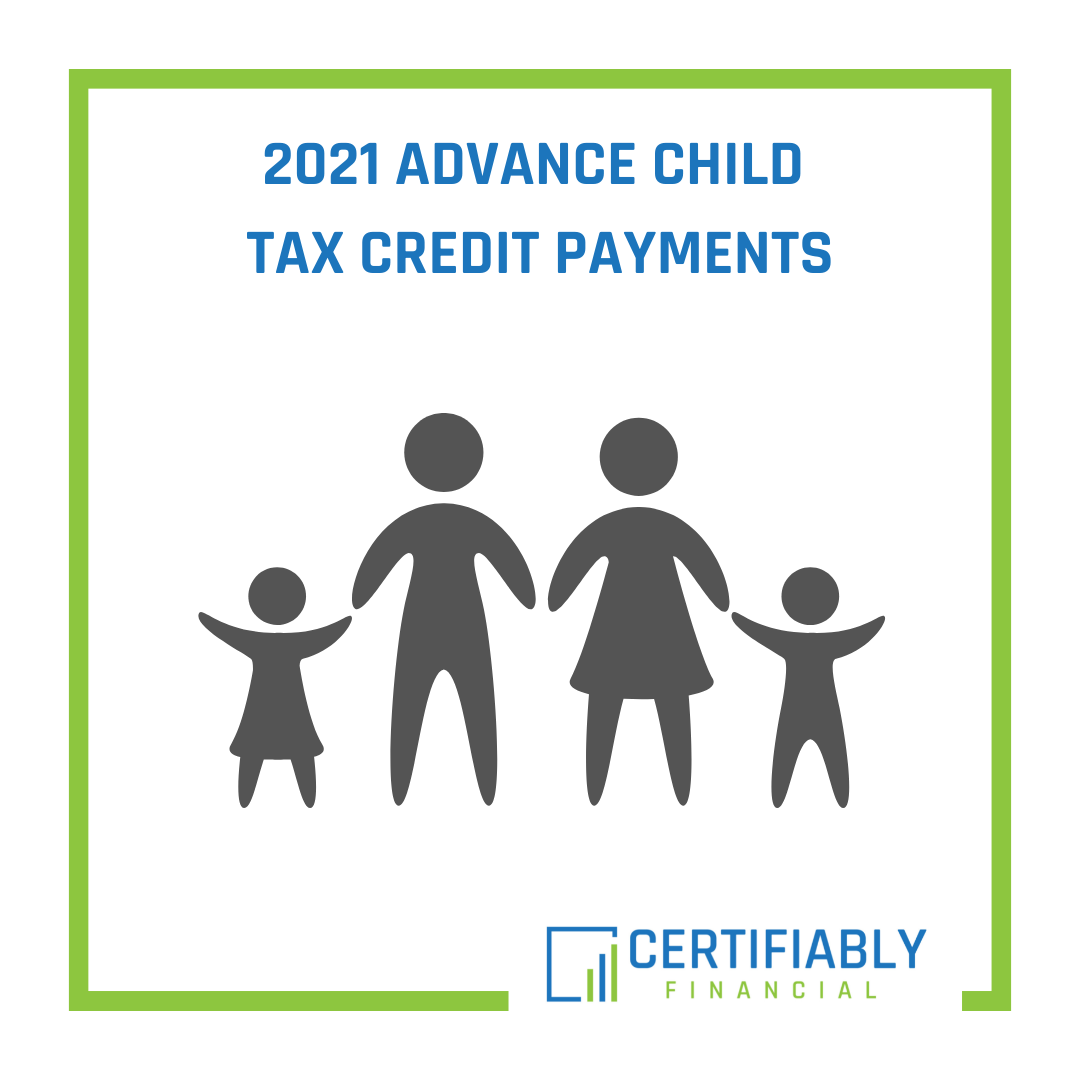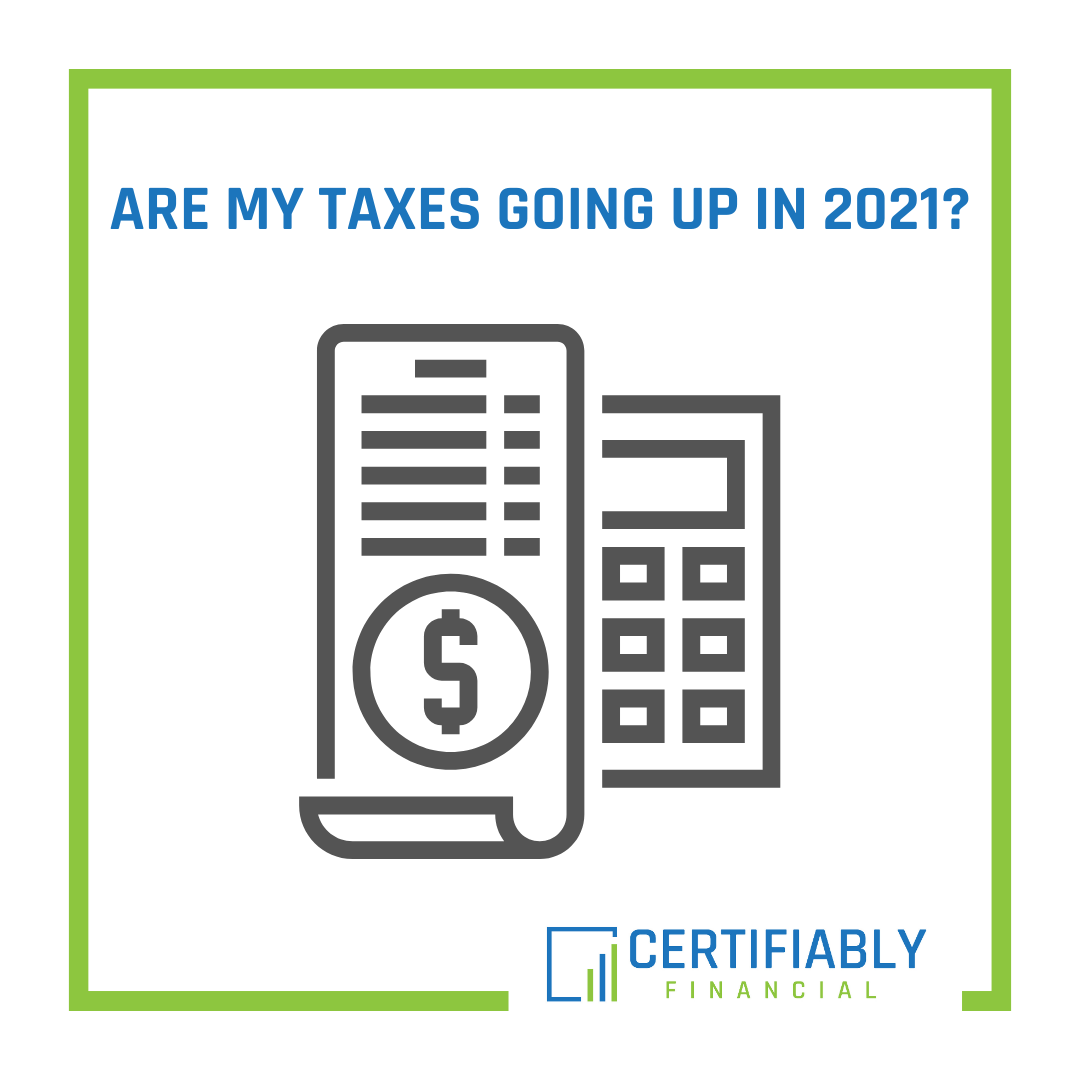As I wrote last week, you may be set to receive Advance Child Tax Credit payments if you received a Child Tax Credit on the last tax return that you filed and your income qualifies you for the payments. You should have received a letter from the IRS about this if you qualify. Essentially, (again, if you qualify) the IRS will be sending half of your estimated 2021 Child Tax Credit as advance payments from July through December. If you want to learn more about Advance Child Tax Credit payments, you can find the article here.
Taxes
2021 Advance Child Tax Credit Payments
Kids are expensive. According to the USDA, the cost of a middle-income married couple raising a child born in 2015 was expected to be $233,610 from birth through the child’s age 171. That seems like an insane amount of money. Luckily, a law passed earlier this year may help out with a small portion of your 2021 expenses.
Are My Taxes Going Up in 2021?
I’ve heard many versions of the question “Aren’t taxes going up?” over the past couple of weeks. This often comes along with a misguided (but partially true) statement about something that the person has heard about President Biden’s proposed tax plan. Unfortunately, we’re often provided with the headlines that make compelling news rather than a detailed report of the news.
Day 23 Of 30 Days Of Stay-At-Home Personal Finance Wins: Review & Update Your W-4
What if you were able to come out of this time of social distancing and economic crisis with a stronger and healthier financial life? What if you looked at this as an opportunity to take a little bit of your extra time each day to work on your finances?
Tips To Lower Your 2019 Taxable Income
3 minute read
Save To Tax-Advantaged Accounts
There are many options for you when it comes to saving that will help you to decrease your taxable income. Contributing money to an employer provided retirement account such as a 401(k) or 403(b), saving to an IRA, or contributing to a Health Savings Account (HSA) are all ways to decrease your taxable income, which in turn will decrease the amount of taxes that you’ll have to pay. An even bigger benefit to saving to these accounts is that you’ll be helping your future self prepare for retirement and/or large medical expenses.
Another option is to save to a 529 College Savings Plan. Indiana residents who file taxes in Indiana receive a 20% tax credit on up to $5,000 in contributions to Indiana CollegeChoice 529 Savings Plans. That’s up to a credit of $1,000 taken directly off your tax bill ($5,000 contribution x 20% credit). Tax credits are better than tax deductions because they reduce your tax bill dollar-for-dollar whereas deductions only marginally reduce the amount of taxes that you pay.
Maximize Your Employee Benefits
Besides making contributions to your employer retirement account, there are often other employee benefits that employers provide that you can take advantage of to reduce your taxable income. Some of the best, but often overlooked, benefits that you may have available to you are the dependent care FSA and the HSA, which I mentioned above.
An HSA will not only allow you to save on Federal taxes, but you also do not pay FICA (Social Security & Medicare) taxes on money that you contribute to the account, if the contributions are setup through your employer’s payroll system. (if you make contributions directly, then you’ll still have to pay FICA taxes on that money).
If you’re paying for daycare or before/after school care for your kids, then contributing to a dependent care FSA is a no-brainer. You’re already paying for the care for your child and using the dependent care FSA allows you to do so in a tax-free manner, up to a limit. You should be taking advantage of this benefit if it’s available to you and you’re currently paying for dependent care expenses.
File A New W-4
A W-4 is a the Employee’s Withholding Allowance Certificate that you file with your employer (you probably did this when you first began working there). This document tells your employer (or more likely your employer’s payroll company) how much to withhold from your paycheck for taxes.
If you owed a significant amount in taxes this year, or even if you’re getting a hefty refund, you may want to consider filing a new W-4 with your employer to have a more appropriate amount withheld from your paycheck. This can help to make sure that you don’t end up in the same situation come tax time next year. While updating your withholdings through filing a new W-4 doesn’t decrease your taxes, it can help to make things easier when it comes time to file next year – making sure that there’s not a large balance due when you file or making sure that you keep more money in your pocket throughout the year and receive a smaller refund.
Start Saving On Taxes Now
Articles about how to save money on taxes are usually written towards the end of the year when people begin to think about how much they will owe and start trying to figure out if there are any last minute things they can do to decrease their taxes. Being proactive and starting to implement some of these strategies now will help you make sure that you’re able to relax while everyone else is searching for end-of-year tax savings tips.
An Anytime Tax Saving Strategy For Indiana
3 minute read
The funny thing is that people could have been taking advantage of almost everyone of those tips throughout the year rather than waiting until December and having a deadline push them to make sure that they get it done. There isn’t really anything special about the end of the year when it comes to saving money on taxes except it gives you a deadline to complete most of these things by and it’s the time when most people are thinking about making charitable contributions that could reduce their taxes.
Luckily, those of us who live in Indiana have a “year-end” tax planning strategy that provides benefits beyond just tax savings for this year. Actually, that’s a lie. You can complete this strategy at any point throughout the year and still receive the benefits – it’s an “anytime” tax saving strategy.
Might as well join the crowd, right? But, I only have one tip for you, not a full list. And it (mostly) only applies to those who file taxes in Indiana.
Enter The 529 Savings Plan
The 529 Savings Plan was originally created in 1996 as a tax-advantaged post-secondary education savings plan for college, technical school, and vocational school, but has recently been changed to allow the money to be used for primary and secondary education tuition as well (up to $10,000 per student per year).
The tax advantages of a 529 plan come from investing the money and using it for education expenses. You can contribute money to a 529 Plan, choose an investment option and allow the money to grow tax-deferred, and then pull out the money tax free, if you use it for qualified education expenses. Withdrawing money from the account to use it for anything besides qualified education expenses will result in having to pay taxes on the earnings portion of the account as well as paying a 10% penalty.
The Indiana 529 Plan Advantage
In addition to being able to save in a tax-advantaged account for a loved one’s education, Indiana offers a tax credit for contributing to a 529. As of 2018, you can receive a 20% tax credit on up to a $5,000 contribution to an Indiana 529 Savings Plan if you are a resident of and file your state taxes in Indiana.
For example, if you contribute $5,000 to an Indiana 529 Savings Plan and are an Indiana filer, then you will receive a $1,000 credit on your Indiana income tax ($5,000 x 20%). This is the maximum credit available. If you contributed $1,000 to the plan, then you’d receive a $200 tax credit.
A tax credit is better than a tax deduction (you receive deductions for things such as charitable contributions and saving to your retirement account) because a credit reduces your tax bill dollar-for-dollar while deductions only marginally reduce your tax bill.
That’s an awesome benefit for helping someone receive further education and helping to reduce the burden of paying for it.
If you’re looking for a last minute tax strategy, just want to save some money on qualified education expenses that you’re already paying for anyways (why wouldn’t you), or even need a holiday gift idea (although it may not be appreciated until much later), then you might want to consider contributing to a 529. However, you need to be certain that your contributions to the account are initiated via electronic funds transfer by December 31 to be eligible. Otherwise, you’ll lose out on your 2018 tax credit and will have to settle for a credit in 2019 and beyond.
When you’re done making sure that you help fund someone’s education and receive a tax benefit for doing so in 2018, you might as well set up automatic contributions for 2019 so that you don’t have to rush through this same process again next December. Remember, this is an anytime tax saving strategy, not a year-end tax saving strategy.
If you’re an Indiana tax filer and you pay for qualified education expenses at a qualified primary school, college, technical school, or vocational school and you’re not contributing to an Indiana 529 plan, then you’re missing out on a tax credit that you should be taking advantage of. Even if you have a child who is a senior in college and you plan on paying for their final semester in the spring, you could still benefit by contributing to a 529 plan and receiving the tax credit in 2018. Don’t be the person who misses out on tax savings because you waited until the last minute to do something that could have been done at anytime throughout the year.






